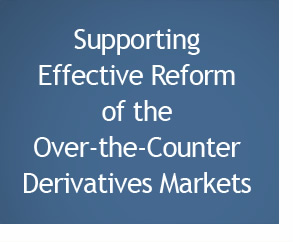03/16/10 - Bloomberg - By Matthew Leising and Shannon D. Harrington
|
|
Wall Street Dominance of Swaps Must End, Brokers Say
March 16 (Bloomberg) -- MF Global Holdings Ltd., Jefferies Group Inc. and at least 19 financial firms want regulators to force swaps clearinghouses to lower entry barriers that restrict competition in a $605 trillion derivatives market dominated by the world’s biggest banks.
Brokers formed an association last month that hired a Washington-based law firm to pursue the issue with lawmakers and regulators, said Mike Hisler, a partner at New York-based Hexagon Securities LLC, a member of the group. They also seek tougher rules to ensure banks trading derivatives don’t try to sway clearinghouse decisions to shut out new competitors.
The debate about access takes place as Congress seeks to empower regulators to dismantle failing financial firms deemed to pose a systemic threat to the economy. Limiting the number and types of firms that can join derivatives clearinghouses concentrates too much risk there, the excluded firms say. It also blocks competition for the largest U.S. banks that made an estimated $28 billion trading derivatives last year.
“If we can have more members or participants it would be a good thing” for the stability of the clearinghouses and the market, said Patrice Blanc, chief executive officer of Newedge USA LLC, the world’s largest futures broker, which is aware of the regulatory lobbying though not a member of the group. “The banks don’t want to open the model; they’re making too much money.”
Big Bank Dominance
The clearing restrictions pit small to mid-size brokers and broker-dealers against their larger competitors, including JPMorgan Chase & Co., Goldman Sachs Group Inc. and Deutsche Bank AG.
Goldman spokesman Michael DuVally, Deutsche Bank spokeswoman Michele Allison and JPMorgan spokesman Justin Perras declined to comment.
Only firms with a net worth of at least $5 billion are allowed to be members of the largest credit-default swap clearinghouse, Intercontinental Exchange Inc.’s ICE Trust. At CME Group Inc.’s venture, that requirement is $500 million, recently raised from $300 million. Both demand expertise in the market, including swaps-trading desks.
Adding more clearinghouse members for swap trades “is in the best interest of the entire financial system,” said Hexagon’s Hisler, whose firm is one of about 20 members of the newly formed Swaps and Derivatives Market Association, which hired law firm Venable LLP to represent them. “Counterparty diversification, like portfolio diversification, is always a wise strategy.”
‘Diverse Models’
Miller Tabak Roberts Securities LLC, BTIG LLC and StormHarbour Partners LP also belong to the association, executives and spokespeople from the firms said.
“We’re working with regulators and exchanges to impress upon them the importance of diverse models” of how brokers and banks can gain access to clearinghouses, said Bernard Dan, chief executive officer of MF Global, which isn’t a member of the group. The broker is building its capabilities and hiring traders in the credit-swaps market so that “maybe in six to eight months we’ll be seen as a major execution agency player,” he said.
MF Global, Newedge and other firms want to act only as brokers and not as market makers, which buy and sell swaps for their own accounts. To gain access to swaps clearinghouses, brokers have to hand over the trades to JPMorgan or another member for processing, limiting how much they can afford to charge customers.
OTC Giants
JPMorgan, Bank of America Corp., Goldman Sachs, Morgan Stanley and Citigroup Inc. executed 96 percent of the $293 trillion in over-the-counter derivatives trades made by the top 25 U.S. bank-holding companies and their customers as of Sept. 30, according to the Office of the Comptroller of the Currency.
Newedge said it’s being shut out of LCH.Clearnet Ltd., the world’s largest interest-rate swap clearinghouse, because of requirements that it have a net worth of $5 billion and at least $1 trillion in outstanding swaps business.
“It’s difficult for us to enter this market,” Newedge’s Blanc said.
Newedge doesn’t want a mandated solution imposed by regulators, said Gary DeWaal, the firm’s general counsel. Instead, it wants access to clearinghouses and believes the market will reward the operation that is most open to as many users as possible, he said.
Seeking Wall
At stake is access to the privately negotiated derivatives markets that generated an estimated $28 billion in revenue last year for the five biggest U.S. dealers, according to company reports collected by the Federal Reserve and people familiar with banks’ income sources.
The Swaps and Derivatives Market Association is asking Congress to give regulators, not clearinghouses, the power to set capital requirements and other rules for membership, according to a mission statement obtained by Bloomberg News. The group also wants tougher conflict-of-interest rules that would require firms to maintain a wall preventing information exchange between their trading desks and clearing operations.
Roger Liddell, chief executive officer of LHC.Clearnet, said the entry barriers are needed because companies making a market in swaps take great risk and must be able to help unwind positions of a bankrupt member bank.
“Being a direct member may bring certain privileges, but it also brings significant responsibilities,” Liddell said. “It’s all based on their ability to be able to step in and help us with a default. Some of the firms that want to become direct members don’t have the ability to do that.”
Role of Clearinghouse
Clearinghouses are capitalized by their members in a structure meant to ensure that trading parties are made whole if any member defaults. They collect margins on outstanding trades each day to keep accounts current and give regulators access to information on market positions.
“The ability to understand the risk profile” of the credit-default swap market by trading as a dealer, not just brokering transactions, is vital for members, said Kim Taylor, president of CME Group’s credit-swaps clearinghouse. Each day its market-maker members provide prices for where contracts are sold and bought to set its margins.
Intercontinental’s clearinghouses have backed $6.3 trillion of credit-swaps trades between banks, according to its Web site. CME has guaranteed $189.5 million. In December, both clearinghouses started allowing banks to clear trades with clients.
‘Moving Quickly’
“It’s very early days in OTC clearing,” said Kelly Loeffler, a spokeswoman for Intercontinental. “We’re moving quickly to bring as much business into a cleared environment under the existing regulatory structure,” she said.
Many members of the Swaps and Derivatives Market Association, like Hexagon, hired former Wall Street traders or salespeople familiar with pitching derivatives trades to hedge funds, insurance companies and other money managers, said Hisler, who joined Hexagon in January 2009 from UBS AG, where he ran a sales group that transacted in corporate bonds, credit- default swaps and collateralized debt obligations among other securities.
“We are not asking for market share; we are asking for the ability to compete for market share,” Hisler said. |



